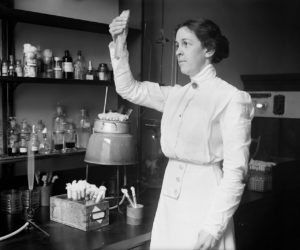February 3 is National Women Physicians Day. This day was chosen to celebrate Women Physicians in honor of Dr. Elizabeth Blackwell’s birthday. Dr. Blackwell was the first woman to matriculate at a US medical school, and her acceptance in 1847 was initially a joke. In those times, medicine was very much a man’s world, but the joke was on them because, after graduating in 1849, Dr. Blackwell, her sister Dr. Emily Blackwell and Dr. Marie Zakrzewska began providing training opportunities for other women physicians when they created the New York Infirmary for Women and Children in 1857. Since then, women have made some strides in medicine and have made significant contributions to the science, changing the way we practice medicine today; but as a society we have not celebrated these women as often as we should, and there are still important gains to be made with respect to equality in compensation, academic promotion and recognition.
Within our specialty of Infectious Diseases (ID), 36% of IDSA members, 45% of PIDS and SHEA members and 52% of adult (ID) trainees are women, but do these women know of the women who blazed the trail for them? In honor of National Women Physicians Day, here is a short look at some women in the field of ID/microbiology who changed our specialty. The women featured here were not clinicians (because 1. Infectious Diseases did not exist as a specialty at that time, and 2. It was still difficult for women to actually become physicians at that time) but within our specialty, they were the ones who tossed the first stones to shatter the glass ceiling, and should be lauded for their contributions to the way we practice medicine today.
They are some of the giants on whose shoulders we ALL stand.

Alice C Evans, MS (1881-1975) Photo Credit: National Photo Company Collection, restored by Adam Cuerden – This image is available from the United States Library of Congress’s Prints and Photographs division under the digital ID npcc.30943.
Alice Evans was a trailblazer. After obtaining a Bachelor of Science in bacteriology from Cornell University in 1909, she was the first woman to obtain a scholarship and Masters of Science in bacteriology from the University of Wisconsin-Madison in 1910. She had a farming background, having been raised on a farm in Pennsylvania, and subsequently became the first female scientist at the United States Department of Agriculture (USDA). She focused her work on unpasteurized milk and was the first to hypothesize that brucellosis could be transmitted by drinking unpasteurized cow’s milk. Though she did not have a doctoral degree, her work was published in the Journal of Infectious Diseases in 1918 and subsequently confirmed. This data was instrumental in the efforts leading up to development of milk pasteurization and subsequent reduction in cases of brucellosis reported in the United States. In 1928 she was honored as the first female president of the society of American Bacteriologists (now American Society for Microbiology – ASM), and after retiring in 1945, she took it upon herself to empower young women that they too could pursue careers in science and academia. She was awarded an honorary degree in medicine by the Women’s Medical College of Pennsylvania in 1934 and inducted into the National Women’s Hall of Fame in 1993.

Dr. Rebecca Lancefield, PhD (1895-1981) Photo Credit: http://www.inventricity.com/rebecca-lancefield-microbiologist
Dr. Rebecca Lancefield was a microbiologist who helped to develop testing to differentiate between various hemolytic streptococci (Lancefield classifications). She received her PhD from Columbia University in immunology and bacteriology. She subsequently went on to work at the Rockerfeller Institute, and continued to advance the field with respect to study of streptococci, and their association with rheumatic fever. In 1943 Dr. Lancefield became the second female president of ASM, and for her work in studying rheumatic heart disease, she received American Heart Association Achievement Award in 1964, and was one of few women at the time elected to the prestigious National Academy of Sciences. Rockerfeller University has now dedicated the Rebecca C Lancefield Professorship to honor exemplary women in science at that institution.

Dr. Gladys Hobby, PhD (1910-1993)
Photo Credit: Jean Thomas http://femilogue.blogspot.com/2012/11/gladys-hobby.html
Dr. Gladys Hobby was a microbiologist who played a key role in the development of antibiotics we use today. She grew up in New York City, and earned a PhD in bacteriology from Columbia University. Penicillin was discovered by Dr. Alexander Flemming in 1928, and several years later, during World War II, there was a need for readily available antibiotics to treat war-related infections. Dr. Hobby and her team at Columbia were among the first to begin human clinical trials of penicillin in 1941, and after proving that it was beneficial in eradicating bacterial infections, collaboration with Pfizer (pharmaceutical company) allowed for mass production of the antibiotic for clinical use. Without penicillin, many of the medical/surgical advances we take for granted today (like organ or stem cell transplantation) would not be possible. In 1972, Dr. Hobby founded the scientific journal Antimicrobial Agents and Chemotherapy, which is still publishing papers today.
Editorial note: This is obviously not an exhaustive list, but an introduction to some of the early trailblazers in our field; there are many more women both living and deceased who have contributed to the success of Infectious Diseases, and future posts will continue to celebrate others.
Acknowledgements: Many thanks to Drs. Wendy Armstrong, Judy Aberg, Angela Caliendo, Jeanne Marrazzo, Ada Adimora, Shanta Zimmer, and Erin Bonura, who shared some insights into women who have influenced our field of Infectious Diseases.





Recent Comments